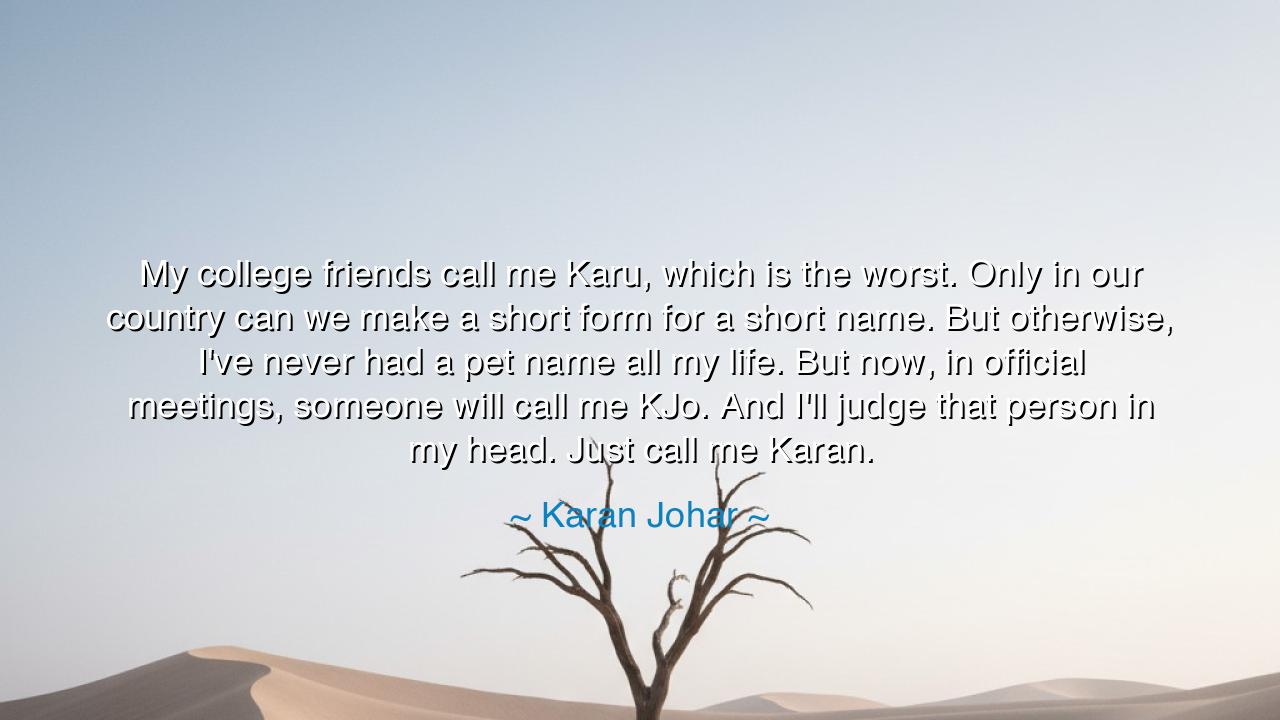
My college friends call me Karu, which is the worst. Only in our
My college friends call me Karu, which is the worst. Only in our country can we make a short form for a short name. But otherwise, I've never had a pet name all my life. But now, in official meetings, someone will call me KJo. And I'll judge that person in my head. Just call me Karan.






Hear, O seekers of dignity and identity, the words of Karan Johar, who declared with clarity and humor: “My college friends call me Karu, which is the worst. Only in our country can we make a short form for a short name. But otherwise, I've never had a pet name all my life. But now, in official meetings, someone will call me KJo. And I'll judge that person in my head. Just call me Karan.” In these words lies more than jest—it is a meditation on names, on respect, on the boundary between familiarity and formality, and on the power a name holds over the soul.
The ancients believed that a name was not merely a label but a vessel of spirit, a sign of one’s essence. To call a person rightly was to honor their being; to twist or shorten it casually was to claim an intimacy that may not exist. Thus, Johar’s lament is not about syllables, but about meaning. “Just call me Karan,” he says, for in that name lies his chosen identity, the name by which his life’s work has been built, the banner under which his voice has reached the world.
Consider the story of Julius Caesar. To his soldiers and comrades he was “Caesar,” a name that carried weight and destiny. Had some senator or rival chosen to address him with a diminutive, it would not have been merely impolite—it would have been an affront, an attempt to diminish his stature. In the same way, Johar rejects KJo in places of seriousness, for it turns a man into a caricature, a brand, a nickname when what is required is the dignity of his full self.
Yet Johar’s words also reveal the paradox of culture. Among friends, nicknames may be tokens of affection, badges of closeness. The “Karu” of his college days was not insult but intimacy, a reminder that names sometimes bend under the weight of love. But when such shortening escapes its proper circle—when it enters boardrooms, interviews, or official spaces—it ceases to be affection and becomes presumption. Thus, Johar teaches that names, like all sacred things, must be used with wisdom, their weight adjusted to time, place, and relationship.
The deeper meaning here is about respect and boundaries. To call someone by a pet name without permission is to assume familiarity that has not been earned. It is to step closer without invitation. And though the world may dismiss this as small, those with wisdom know that respect lives in small things—how we speak, how we listen, how we address. To honor someone’s name is to honor their dignity. To misuse it is to trespass upon their selfhood.
The lesson, therefore, is clear: in life, let us speak to others not as we wish, but as they wish. Call them by the name they hold dear, not the one that entertains us. Let nicknames remain where they belong—among friends, among those who have been given the privilege of closeness. And when in doubt, choose respect, for it is better to err on the side of dignity than to risk diminishing another.
Practically, this means pausing before speech. When you meet another, ask yourself: do I have the right to this familiarity? Have they granted me this closeness? If not, call them as they have asked to be called. For in that act you honor their boundaries, and from that soil grows true trust. The one who respects names will in turn be respected, for respect begets respect.
So let this wisdom endure: Names are not ours to twist at will—they are gifts given by the soul. To speak them rightly is to honor the person; to misuse them is to wound. As Karan Johar has said, “Just call me Karan.” Let this be a teaching: call others as they wish to be called, and you will walk the path of dignity, where friendship is genuine, and respect is the root of all true connection.






AAdministratorAdministrator
Welcome, honored guests. Please leave a comment, we will respond soon